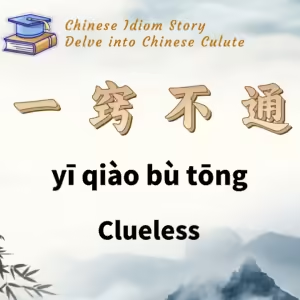
Chinese Idiom: 一窍不通 (Yi Qiao Bu Tong)
English Translation: Clueless
pīn yīn: yī qiào bù tōng
Idiom Meaning: This idiom is used to describe someone who does not understand or know anything about a certain subject or matter. The term “qiào” (窍) refers to the openings or orifices of the body, such as the eyes, ears, nostrils, and mouth.
Historical Source: Lüshi Chunqiu, “Guo Li” (The Annals of Lü Buwei)
Idiom Story: King Zhou of the Shang Dynasty was the last ruler of the Shang, notorious for his tyranny and cruelty. His uncle, Bi Gan, was a loyal and upright minister who repeatedly admonished the king to govern wisely and justly. However, King Zhou, infuriated by Bi Gan’s persistent criticisms, decided to kill him. The king declared that he wanted to see if Bi Gan’s heart was different from others and cruelly ordered his heart to be cut out.
When Confucius heard of this atrocity, he sighed and remarked, “If he had one aperture open, Bi Gan would not have died.” By this, Confucius meant that if King Zhou had even the slightest understanding or sense of reason, his uncle Bi Gan would not have met such a tragic fate.
Over time, this phrase was shortened to “Clueless” (一窍不通), illustrating complete ignorance or lack of understanding about a particular subject.






